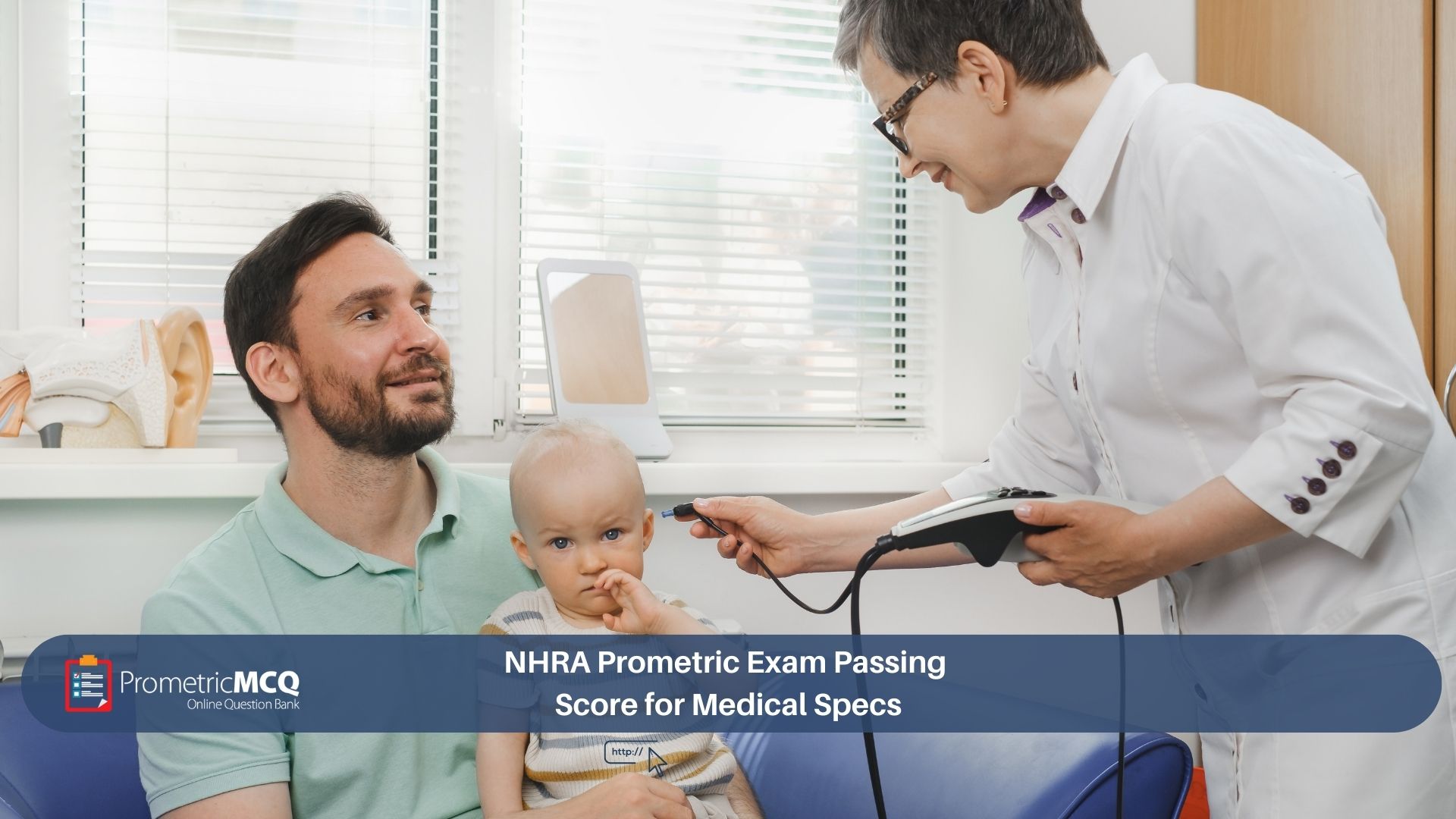
NHRA Prometric Exam Passing Score for Medical Specs
fatima@prometricmcq.com2025-09-19T01:41:18+00:00Table of Contents
ToggleNHRA Prometric Exam Passing Score for Medical Specs (2025)
For physicians, specialists, and surgeons aspiring to practice in the Kingdom of Bahrain’s advanced healthcare landscape, a single question often dominates the preparation process: “What is the passing score for my NHRA medical specialty exam?” This pursuit of a ‘magic number’ is driven by the high-stakes nature of the licensure exam, which serves as the ultimate benchmark of clinical competency required by the National Health Regulatory Authority (NHRA).
However, the reality of the NHRA Prometric scoring system is far more sophisticated than a simple percentage. The exam is not designed to be a competition, but a criterion-referenced assessment to ensure every practitioner who earns a license meets a predetermined standard of safety and excellence. This means that while there’s no officially published score, a deep understanding of the expected competency level for your specific medical field is crucial for success.
This ultimate 2025 guide is meticulously designed to demystify the NHRA passing score for all major medical specializations. We will break down the official scoring methodology and provide expert-analyzed, estimated passing ranges for General Practitioners, Internal Medicine specialists, Surgeons, Pediatricians, and many others. We will explore the nuances of what each exam demands and arm you with a strategic approach to ensure your performance is well above the required threshold. Complemented by a detailed 10-point FAQ, this guide will replace ambiguity with a clear, confident preparation strategy.
Key Takeaways on Medical Spec Passing Scores
- Official Result is Pass/Fail: The NHRA does not provide a numerical score; your official result is simply “Pass” or “Fail.”
- Estimated Benchmark: The generally accepted passing range for most medical specialty exams is between 60% and 65%.
- Strategy is Key: Don’t aim for the minimum. A successful strategy involves consistently scoring 70-75% or higher in high-quality practice tests to create a safe buffer.
- No Negative Marking: You are not penalized for incorrect answers, so it is imperative to attempt every single question on the exam.
- Competency Over Competition: The exam measures your ability against a fixed standard of competence, not against the performance of other candidates.
Demystifying the NHRA’s Scoring Methodology
Before diving into specific specialties, it’s essential to understand that the NHRA Prometric exam is not graded on a simple curve. The system is designed to be fair, reliable, and legally defensible, ensuring that all licensed physicians are competent to practice safely.
Core Principles of NHRA Scoring:
- Psychometric Analysis: Each question on the exam has been pre-tested and analyzed for its difficulty and ability to discriminate between competent and non-competent candidates. A panel of subject matter experts for each specialty determines the minimum level of knowledge required to pass, and the exam is calibrated to this standard.
- Scaled Scoring and Equating: To maintain exam security, multiple versions (or “forms”) of each specialty exam are used. Since one form might be marginally more difficult than another, a statistical process called “equating” is used to adjust for these minor differences. This ensures that the passing standard remains consistent, regardless of which set of questions a candidate receives.
The question isn’t “Did I score higher than others?” but rather, “Did my performance demonstrate the level of knowledge required for safe, independent practice in Bahrain?”
NHRA Passing Scores: A Guide for Medical Specializations
While the official score is binary, extensive data from candidate experiences allows us to provide reliable estimates of the passing threshold for major medical fields. Understanding the focus of your specific exam is crucial to tailoring your Bahrain NHRA exam preparation.
General Practitioner (GP)
- Estimated Passing Score: 60% – 65%
- Exam Focus: The GP exam is arguably one of the broadest. It demands a solid, practical knowledge base across all major fields of medicine. The emphasis is on recognizing common presentations, managing acute conditions, handling emergencies, and knowing when to refer to a specialist.
- High-Yield Topics: Management of chronic diseases (Diabetes, Hypertension, Asthma), common infectious diseases, basic pediatrics and OB/GYN, interpreting ECGs and X-rays, and emergency care (ACLS/BLS principles).
- Recommended Resource: A robust QBank for General Practitioners is essential for covering the wide syllabus.
Internal Medicine
- Estimated Passing Score: 60% – 65%
- Exam Focus: This exam requires a deep, evidence-based understanding of adult diseases. Unlike the GP exam, it delves into more complex diagnostic and therapeutic challenges, including the latest clinical guidelines and landmark trials.
- High-Yield Topics: Cardiology (ischemic heart disease, heart failure), endocrinology (complex diabetes management, thyroid disorders), gastroenterology, nephrology, and rheumatology.
- Recommended Resource: Focus your practice with specialized Internal Medicine MCQs.
Pediatrics
- Estimated Passing Score: 60% – 65%
- Exam Focus: The pediatrics exam centers on growth and development, congenital conditions, infectious diseases in children, and vaccination schedules. A key skill tested is the ability to recognize signs of serious illness in a child.
- High-Yield Topics: Developmental milestones, immunization schedules, management of common pediatric emergencies (e.g., croup, bronchiolitis, dehydration), and neonatal care.
- Recommended Resource: Prepare with targeted Paediatrics MCQs.
General Surgery
- Estimated Passing Score: 60% – 65%
- Exam Focus: The surgery exam assesses knowledge of pre-operative assessment, intra-operative principles, and post-operative management and complications. It heavily emphasizes the acute abdomen and trauma management.
- High-Yield Topics: Management of appendicitis, cholecystitis, bowel obstruction; principles of wound healing; fluid and electrolyte management in surgical patients; and ATLS principles for trauma.
- Recommended Resource: Sharpen your skills with a dedicated General Surgery QBank.
Obstetrics & Gynecology (OB/GYN)
- Estimated Passing Score: 60% – 65%
- Exam Focus: The exam is divided between obstetrics (care of the pregnant patient) and gynecology (management of diseases of the female reproductive system).
- High-Yield Topics: Antenatal care, management of labor and delivery, obstetric emergencies (e.g., hemorrhage, eclampsia), common gynecological conditions (e.g., fibroids, endometriosis), and principles of contraception.
- Recommended Resource: Use a specialized set of Gynaecology and Obstetrics MCQs.
Frequently Asked Questions (FAQs) for Medical Professionals
Not necessarily higher in percentage terms, but the standard of knowledge required is significantly deeper and more specialized. The passing score is set to reflect the knowledge a minimally competent practitioner in *that specific field* must possess. Therefore, while the percentage might be similar (e.g., 60-65%), the difficulty and depth of the questions are much greater.
Questions are written and reviewed by a panel of practicing physicians and subject matter experts in Bahrain and the region. Each question is mapped to the official exam blueprint and validated to ensure it is clinically relevant, accurate, and fair before it is used in a live exam.
Passing the exam is the most critical step, but it is not the final one. After passing, you will receive an eligibility letter. You must then complete the Primary Source Verification (PSV) process with the DataFlow Group and secure a job with a licensed facility. Your employer will then use your “Pass” result and positive PSV report to activate your professional license.
No. The NHRA exam is based on international, evidence-based medical standards. As long as your medical education was robust and you prepare using up-to-date, internationally recognized resources (like Harrison’s or the latest AHA guidelines), you will be on a level playing field with all other candidates.
While the vast majority of the exam is based on international guidelines, there may be some questions related to public health priorities or specific regulations in Bahrain. It is wise to visit the Bahrain Ministry of Health and NHRA websites to familiarize yourself with any major public health initiatives or specific prescribing laws. The official NHRA website is the best source for this.
Do not just look at the overall percentage. Dive deep into the analytics. Identify the specific subjects or systems where you are consistently scoring below your average (e.g., Cardiology, Biostatistics). Dedicate extra study time to these weak areas. Your goal should be to bring all subjects up to a consistent level of performance.
Generally, Prometric and the NHRA have a very rigorous and automated scoring process, and re-evaluation requests are typically not entertained. The process is highly standardized to minimize the possibility of scoring errors. Your best course of action after a “Fail” result is to analyze your preparation, identify weaknesses, and prepare for a retake.
In the final two weeks, your focus should be on your identified weak areas. You will gain more points by improving a weak subject from 50% to 65% than you will by trying to improve a strong subject from 80% to 85%. Use mock exam data to guide this final, targeted review.
Yes, the NHRA provides a “Scope of Practice” or “Competency Framework” for each profession, which serves as the official exam blueprint. This document is the most important guide for your preparation, as it outlines all the domains and topics that are eligible to be tested.
Look for a platform that offers a dedicated question bank for your specific medical field. Ensure the questions are case-based, include detailed rationales, and allow for both timed and tutor modes. A comprehensive resource is vital for effective preparation. You can browse a wide variety of options on the MCQs Packages page.
Conclusion: Aiming for Excellence, Not Just the Pass Mark
While understanding the estimated passing score for your NHRA medical specialty exam provides a useful benchmark, the ultimate strategy for success is to aim for comprehensive mastery. The exam is a measure of your ability to be a safe, competent, and effective physician in Bahrain. By focusing your preparation on a deep understanding of clinical principles, using high-quality study materials, and consistently testing your knowledge with a robust QBank, you will naturally perform well above the required threshold. Shift your mindset from “What do I need to pass?” to “How can I master this material?” and you will be on the definitive path to success.
Ready to Exceed the Passing Standard?
Our premium MCQ packages for all medical specializations are crafted to reflect the real NHRA exam, with thousands of high-yield clinical vignettes and evidence-based rationales to guarantee your success.










